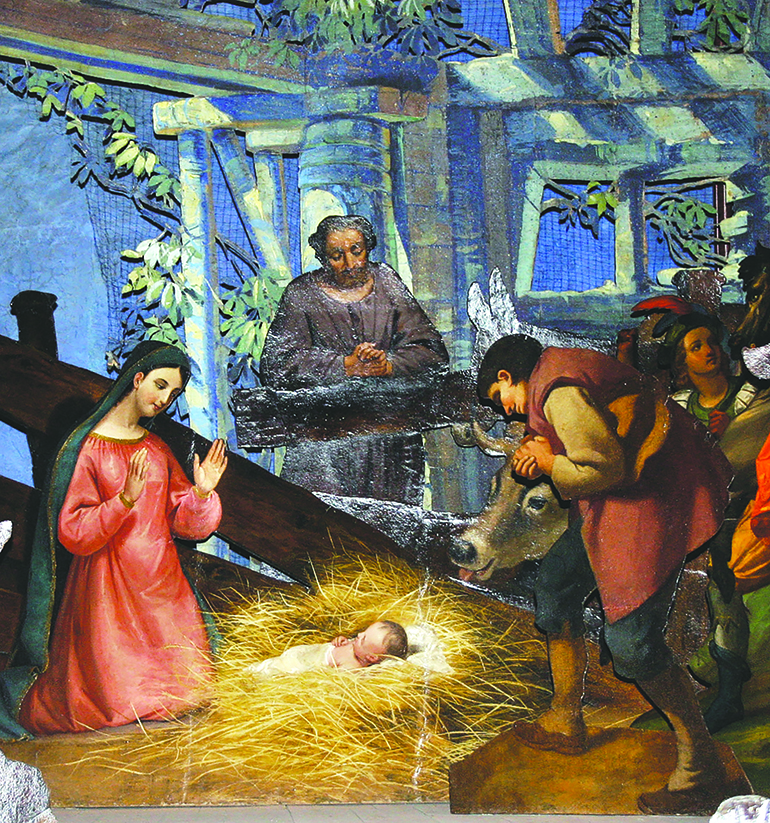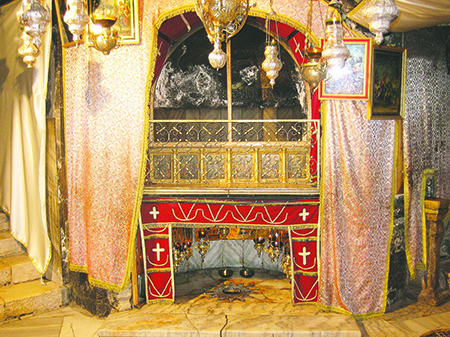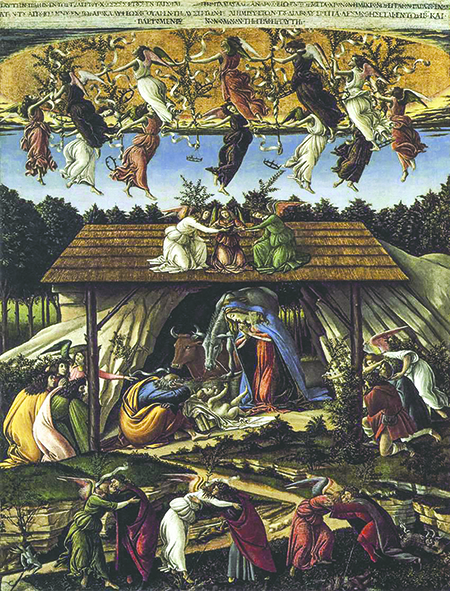By Rocio Granados - La Voz Catolica

Photographer: G. Dall'Orto
Presepe by Francesco Landonio, (Nativity of the Lord) around 1750. It is on display in San Marco Church, Milan.
MIAMI | For Christians, Christmas is the time that we associate with sharing with family and friends in a festive atmosphere, with Christmas trees, nativity scenes, Christmas lights, Christmas carols and lots of presents, all to celebrate the Good News, the birth of our Savior, Jesus.
However, the early Christian communities had none of that 2,000 years ago, and even, "according to historians, Christmas was not celebrated until many centuries later. Easter was the original great feast of Christianity," said George Rodriguez, professor of theology at Msgr. Edward Pace High School, and adjunct professor at St. Thomas University, both in Miami Gardens, during the December episode of the archdiocesan podcasts Cuéntame Católico and What the Faith, Miami?
It was within these early Christian communities that accounts of the infancy of Jesus began to be transmitted orally and collected in only two sections of the New Testament — in Matthew and Luke — and without much detail. It is believed that the community of Luke was located in what is now Syria, and that the account was written in the 80s of the first century.
The communities that produced these Gospels were interested in the significance of what God had done for humanity through Jesus. "It is impressive because its content speaks of what has transformed the world so much: Jesus today is the most influential person in history," said Rodriguez, who is also adjunct professor at Loyola University in New Orleans. Since there are currently 2.5 billion Christians and almost 2 billion Muslims who consider him to be a prophet, almost half of humanity has some connection to Jesus, Rodriguez added.
Photographer: Courtesy The 14 point silver star marks the exact spot where Jesus was born; inside the Church of the Nativity in Palestine. Photographer: Courtesy The Mystical Nativity, 1501; by Sandro Botticelli, in the National Gallery, London.

ACCOUNTS OF JESUS’ CHILDHOOD
The stories about Jesus' infancy told in Luke and Matthew make us feel nostalgic and give us good feelings, but the first communities would not have heard them that way. "These communities were mostly unknown minorities and were always threatened, and the whole world assumed the existence of multiple gods," Rodriguez explained. "Theirs was another way of interpreting reality."
If we pay attention, Rodriguez further explained, Luke and Matthew present the birth of Jesus with very impressive sociocultural and even political ramifications. The main reason for these accounts is theological; both want to express what Christians would have experienced: the grace of God in Jesus Christ; that God had done something totally unique and singular in Jesus; that in Jesus, God was coming into our world in solidarity with human beings, and the humble birth of Jesus is a great expression of that. More than a prophet, more than a great teacher of ethics, of morals, Jesus is the face of God among us.
But we know that Jesus was executed because he was considered a political threat. On the cross, he was given the title "Jesus of Nazareth, King of the Jews" and crowned with a crown of thorns as a form of mockery of both him and the Jewish people. Pontius Pilate, the Roman governor, basically tells the Jewish people that this sort of king is the only one they will ever have. At the same time, the oppression of the empire is exposed by his cruelty, Rodriguez explained.
Scholars have noted that Luke’s infancy narrative tends to contrast two figures: Jesus and Augustus Caesar, the Roman emperor who issues an edict for a census to be taken of "the whole world." As a consequence of this decree, Joseph must return to Bethlehem, taking the pregnant Mary with him.
On the one hand, early Christians would know the great triumphs and achievements of Augustus Caesar, whose original name was Octavian. He managed to unify the peoples around the Mediterranean Sea under the Roman Empire, bringing about an era of great economic prosperity such as the world had never known, modernizing the world and also bringing peace.
On the other hand, there is Jesus. Luke writes that at that time the angel of the Lord appeared to some shepherds with a message: "Do not be afraid; for behold, I proclaim to you good news of great joy that will be for all the people. For today in the city of David a savior has been born for you who is Messiah and Lord. And this will be a sign for you: you will find an infant wrapped in swaddling clothes and lying in a manger." And at that moment a multitude of angels glorified God saying, "Glory to God in the highest and on earth peace to those on whom his favor rests."
LORD, SAVIOR, EMPEROR, MESSIAH
"We see here not only the titles that had been given to Augustus: Lord, Savior, Emperor, Messiah, but also his very name, Augustus, which means venerable and son of the divine because he was the successor of Julius Caesar, who was considered divine. He is also given the great achievement of the Roman Empire, which is the Pax Romana. With Jesus, we speak of another peace, a peace that comes from beyond, that comes from God," Rodriguez said.
The community that wrote this showed a lot of courage in proclaiming that the one who was going to have the most influence in the world was not going to be the one that everyone at that time would have assumed — like great emperors, monarchs, philosophers — but the one who was least expected, a Jew crucified in Palestine. And they make the proclamation in this Gospel, not when they were impressive communities with a Vatican and dioceses all over the world. They made the proclamation of this faith when they were communities on the fringes of society.
In the Gospels, we find God coming into the world in the vulnerability of a child, in the vulnerability of humanity.
"This person who comes, not from palaces, but from the people; who is cared for not by the armies, but by the shepherds, considered the lowest in the society of that time, this is the chosen one. And he is not just a prophet, he is not a politician. This is someone with whom we encounter divinity, and divinity touches us and comes to meet us in a completely unique way; who will transform us and transform the world with love, which is the only power and is the only one that heals, that brings hope, that brings light, that is imaginative, that is creative, that opens a way when there is no way. This is the God who reveals himself here," he explained.
It is a true revolution when in Luke's Gospel, Jesus goes to the synagogue on the Sabbath, as was the custom, and reads what would be his inaugural address: "The Spirit of the Lord is upon me, because he has anointed me to bring glad tidings to the poor. He has sent me to proclaim liberty to captives and recovery of sight to the blind, to let the oppressed go free."
“They are powerful words. That’s his agenda and the Christians who follow Jesus have to do something like this as well. For Christians, reading these Gospel narratives affirms our faith in many ways, strengthens it, and also teaches us how to follow Jesus Christ," Rodriguez said. "Christmas is not only celebrating a recounting of the birth of Jesus, but the meaning of who Jesus is. Christmas is an opportunity to connect with the biblical texts, maybe even read the Gospels from beginning to end."
FIND OUT MORE
If you would like to listen to the complete interview with George Rodriguez on the Cuéntame Católico and What the Faith, Miami? podcasts. Click on the link to listen.

